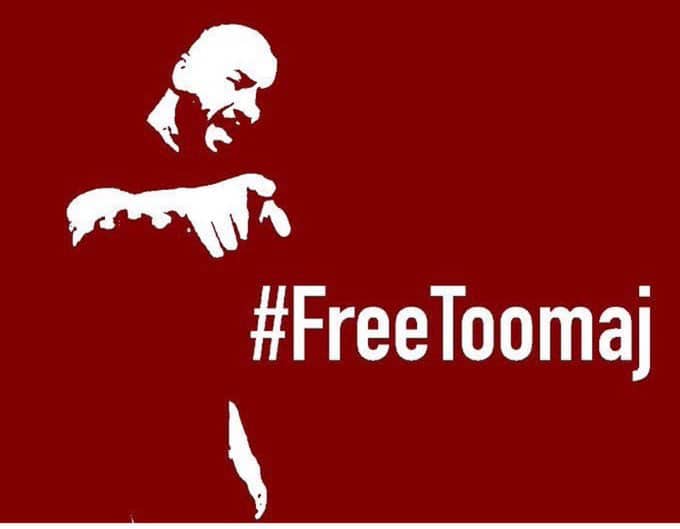
Let’s play a guessing game. In the past decade and a half, which of the following has Iran arrested: A team of 14 “spy squirrels” it found near a nuclear plant; two pigeons who were taken into custody and whose fate remains unknown; or a rapper whose songs criticize a 25-year agreement between Iran and China?
The answer is all three. In 2007, the squirrels were arrested “before they were able to take any action,” according to an Iranian official; one year later, Iran arrested two pigeons near the Natanz nuclear facility. And on September 13, twelve security forces arrested a popular Iranian rapper named Toomaj Salehi at his home.
In his songs, Salehi has criticized the regime’s devastating corruption, including the Iran-China cooperation pact, which was signed between the two countries last March, and which, according to Reuters, will bring Iran into “China’s Belt and Road Initiative, a multi-trillion-dollar infrastructure scheme intended to stretch from East Asia to Europe.” In response, over 200 Iranian activists (mostly exiled) protested the pact, calling it “invalid and inhumane,” and arguing that it sells out the interests of Iranian citizens. The agreement will undoubtedly compromise Iranian workers in particular (and decimate the environment), which explains one of Salehi’s raps: “Haven’t you suffocated us enough? Haven’t you played us long enough? Haven’t you f—ed us over enough? Haven’t you robbed us enough? Now, you want to give half to China and the rest to Russia.”
As I listened to his heartbreakingly poetic lyrics in Persian, I realized that Salehi is a crucial voice for the voiceless, especially for political prisoners and the poor.
Salehi has criticized far more than the pact, particularly in newer songs such as Rat Hole and Normal Life. As I listened to his heartbreakingly poetic lyrics in Persian, I realized that Salehi is a crucial voice for the voiceless, especially for political prisoners and the poor. In “Normal Life,” he raps, “Here people are only alive. They don’t have a life. Our children sleep hungry at night. Excuse me, but how does your conscience sleep at night?”
In “Rat Hole,” he also goes after the regime: “If you saw people’s pain and closed your eyes, if you saw oppression of innocents and just walked by, if you did it out of fear or for your own gain, you’re an ally of the tyrant, a criminal just the same. Without your cover-ups, this system’s incomplete. Iran has enough prisons to hold all of you.”
After his arrest, Iranians immediately took to social media with the hashtag, #FreeToomaj. Finally, on September 21, Salehi was released on bail (though he is currently charged with “spreading propaganda against the state”).
The arrest served as yet another harsh reminder of everything I and hundreds of millions of people take for granted in this country. Imagine an American rapper being arrested for criticizing the government. Actually, I can imagine it, at least the criticism part. At the 2017 BET Hip Hop Awards, rapper Eminem rapped a five-minute tirade against then-president Donald Trump, in which he alluded to the president as “a kamikaze that will probably cause a nuclear holocaust while the drama pops.” He then challenged Trump supporters:
“You’re either for or against/ And if you can’t decide who you like more and you’re split on who you should stand beside/ I’ll do it for it for you with this/ F–k you. The rest of America stand up/ We love our military, and we love our country/ But we f–king hate Trump.”
Eminem joined a slew of other rappers who took aim at Trump during his administration. And what happened to all of these rapper dissidents? Nothing. Absolutely nothing, because this isn’t Iran. If you’re expecting American rappers to condemn Salehi’s arrest, don’t hold your breath. In fact, this past summer’s conflict between Israel and Hamas taught me that celebrities only morph into foreign affairs advocates and experts if there’s unresearched Israel-bashing involved.
In the end, Iran may regret having arrested Salehi; such arrests only fuel the fire of further citizen rage.
Yes, oppression and paranoia are never a good mix. In fact, going after a popular artist might prove nothing, if not pigeon-brained.
Tabby Refael is a Los Angeles-based writer, speaker, and civic action activist. Follow her on Twitter @RefaelTabby























 More news and opinions than at a Shabbat dinner, right in your inbox.
More news and opinions than at a Shabbat dinner, right in your inbox.